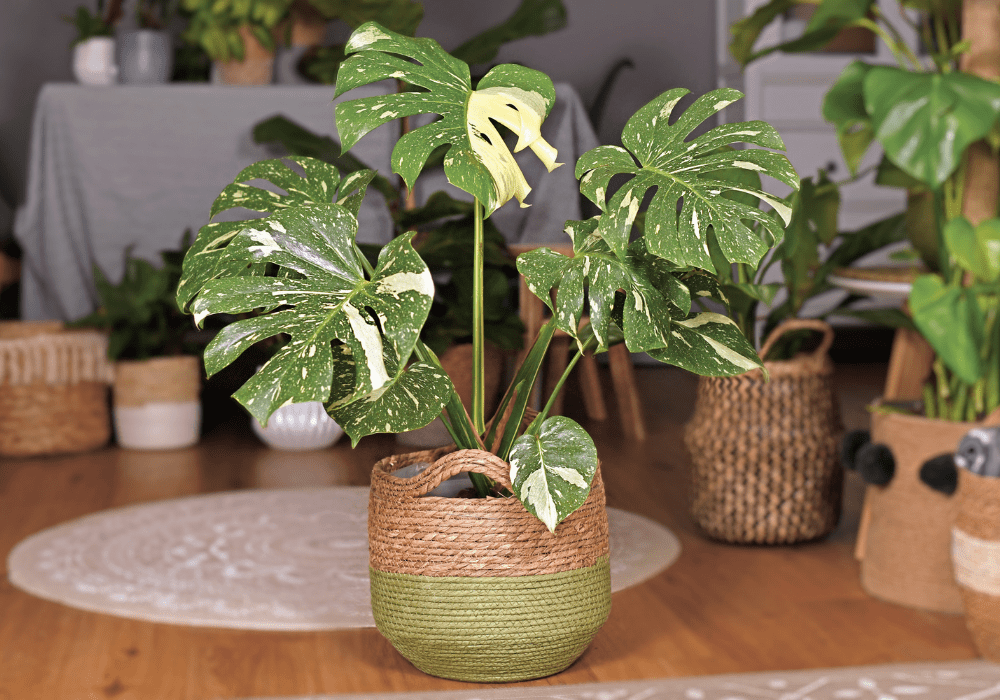Monstera Variegate Care Guide
Monstera Variegate, also known as Variegated Monstera Deliciosa are exceptionally hard-to-come-by houseplants with traditional leaf fenestrations and variegated leaf colours. Because Monstera variegate plants are rare and often unstable, they are prized by collectors. Their care is similar to that of typical Variegated species, however, their variegated leaves have less chlorophyll and require more light to grow.
The Monstera Variegate grows in high humidity (over 60%), well-draining soil, and temperatures ranging from 65 to 80 degrees Fahrenheit (18 to 27 degrees Celsius). During the spring and summer, fertilise with a well-balanced 20-20-20 NPK-Fertilizer on a monthly basis. During the autumn and winter months, do not fertilise. The Araceae family’s Monstera Variegate is a flowering plant that produces fruit. As a result, it’s classified as an Aroid. The Monstera Obliqua and the Peace Lilly are two plants that belong to the Aroid family.
Variegated plant specimens have been one of the biggest trends in houseplants in recent years. A collection’s visual attractiveness is always enhanced by the use of contrasting colours and patterns. The uncommon Instagram sweethearts known as ‘Monstera Variegate’ are a perfect example of this trend. Because these valued plants are rare and few between, many people are wondering how to properly care for them, and, more importantly, how to obtain one. Here is a guide to help you grow and maintain a Monstera Variegate.

Monstera Variegate Care Guide
-
Soil
Carefully check your plant’s watering requirements as soon as you get it. Before you give your plant a drink, check the moisture level in the soil to make sure it isn’t too wet below the surface. Consider aerating your plant’s soil before watering it for the first time. Because we compact the soil to prevent it from shifting during transportation, aeration can assist the soil to breathe and release moisture.
A Monsteras Variegate prefers a continuous mild moisture level in its soil. They don’t want to sit in moist soil because they are epiphytes with aerial roots and are sensitive to overwatering. Your plant could use a drink if the top 2 inches of soil are dry. Rotate your plant on a regular basis to guarantee even development on all sides, and dust the leaves frequently to ensure optimal photosynthetic activity. Take advantage of the opportunity to dust the leaves and inspect the undersides for bugs while you’re at it.

-
Watering
Water in the same way you would most of your houseplants. In most cases, around once a week is sufficient. Ensure that the water drains rapidly and that it remains somewhat damp. The Variegated Monstera Deliciosa dislikes being damp over long periods of time. Wait until the earth has dried before watering again. Your plant will forgive you if you give it too much water once or twice, but if the roots stay wet for too long, they will rot. It’s best to keep the soil damp but not wet.
Is it always a good idea to water your plant until the water runs out of the drainage holes? Then, when the top quarter of the potting soil is dry, repeat the process. That’s all there is to it! Keep in mind that each plant is a unique living organism with distinct needs, especially in its own environment. You’ll have a long and happy relationship with your Monsteras Variegate if you pay attention to its condition and watering requirements.

-
Fertilizing
Use half of the recommended strength of a liquid houseplant fertiliser once a month in the spring and summer. During the winter and autumn, when the Monsteras Variegate is dormant, do not fertilise. Use a well-balanced fertiliser with NPK levels of 20-20-20.
Fertilizer salts can build up in the soil over time, so it’s a good idea to water your plant with plain water every now and again to flush out any salts that have accumulated. Finally, throughout the winter, don’t use any fertiliser and simply water with plain water when your plant isn’t growing much, if at all.
-
Temperature
65-80oF (18-27oC) is the ideal temperature range for a Monsteras Variegate. Temperatures below 50°F (10°C) for an extended period of time will harm your plant and cause it to cease growing.
-
Humidity
High humidity is ideal for the Monsteras Variegate. Some gardeners spray their plants on a daily basis. The Monstera Variegate thrives in heavy humidity, but it can also survive it if you don’t spray your plant. The variegated version’s humidity requirements are much higher than the pure green version’s.
-
Growth
The Monsteras Variegate can reach a height of 10 feet. Monstera plants produce air or airborne roots that assist the plant in establishing a fixation on other plants and trees. The leaves of your Swiss cheese plant will grow larger and the stems will thicken and grow higher if you provide it with a moss pole. The Monsteras Variegate has green leaves with white or yellow variegation. Plants vary widely in their degree of variegation.



